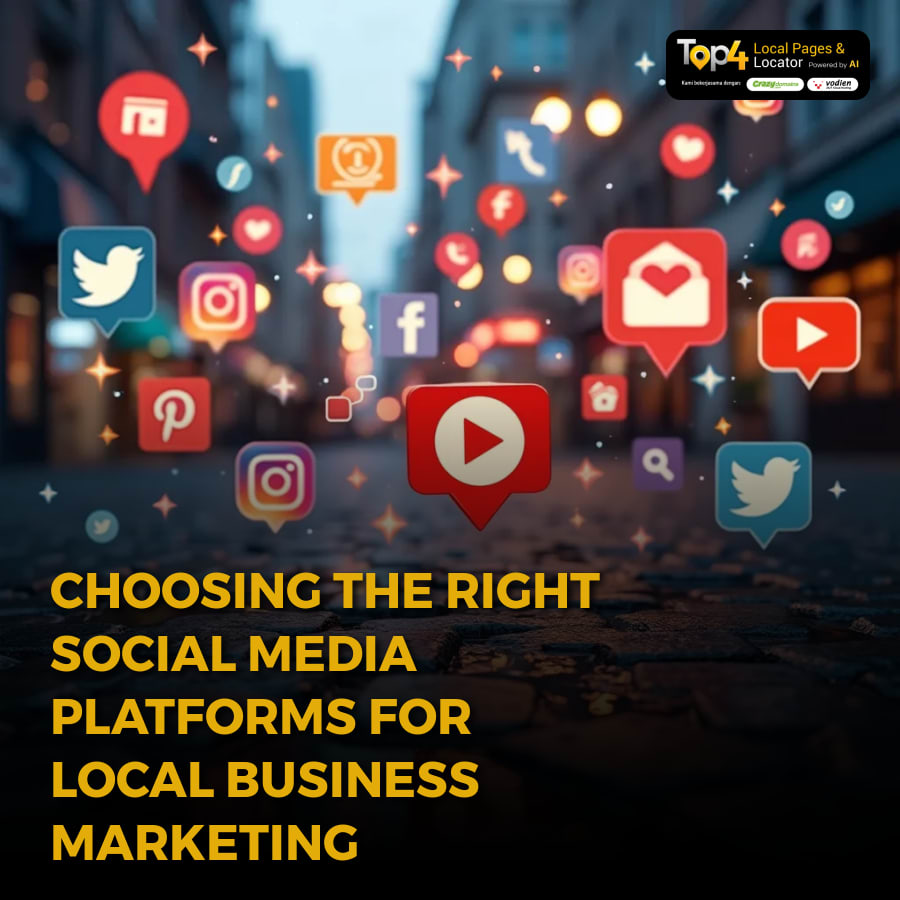Have you ever wondered why some local businesses seem to thrive on social media while others struggle to gain traction? The answer often lies in choosing the right social media platforms for local marketing. Whether you run a small local business or manage a franchise, effectively leveraging social media can be a game changer. But with so many platforms available, how do you know which ones will work best for your local marketing efforts?
In today’s digital landscape, not all social media platforms are created equal. Some excel at fostering local community connections, while others offer tools tailored for businesses looking to attract customers in specific geographic locations. It’s crucial to understand how to utilise these platforms to boost your local visibility and engage with your target audience in a meaningful way. In this article, we’ll take a look at the top platforms that can help you achieve online success for your local business.
Facebook: Building a Local Community
For many local businesses, Facebook remains the cornerstone of their social media marketing efforts. The platform’s vast user base and powerful location-based tools make it an excellent choice for local marketing. With Facebook, you can create a business page that allows potential customers to find essential information about your business, such as location, contact details, and opening hours.
One of Facebook’s strongest features for local marketing is its ability to target ads based on geographic areas. You can set your ads to reach people within a specific radius of your business, ensuring that your promotions reach the right local audience. Additionally, Facebook Groups allow you to engage with your community and build a loyal following by sharing relevant content, responding to questions, and encouraging discussions around your products or services.
Another key aspect of Facebook is its recommendation feature. Local users often rely on these recommendations when searching for nearby services, so having an active, well-maintained profile with positive reviews can significantly boost your credibility. Facebook's event creation tool also allows businesses to promote local events and offers an opportunity to engage with the community directly.
Instagram: A Visual Approach to Local Marketing
If your business benefits from visual marketing, Instagram is a fantastic platform to leverage. Instagram is ideal for local businesses that rely on showcasing products or services visually, such as restaurants, retail stores, and beauty salons. Its emphasis on photos and short videos provides an opportunity to connect with local audiences in an authentic and engaging way.
One of the best features of Instagram for local businesses is the location tagging option. By tagging your posts and Stories with your business’s location, you increase the chances of being discovered by local users browsing Instagram for businesses nearby. Additionally, hashtags specific to your area, such as the name of your city or neighbourhood, can help you reach a broader local audience.
Instagram Stories and Reels also offer creative ways to highlight promotions, show behind-the-scenes content, or even share customer testimonials, giving your brand a more personal touch. For businesses targeting a younger demographic, Instagram is particularly effective, as the platform continues to attract millennials and Gen Z consumers who prefer authentic, visually appealing content.
Google Business Profile: Owning the Local Search
When it comes to local search, Google Business Profile (formerly known as Google My Business) is one of the most important tools at your disposal. This platform is designed to enhance your business’s visibility in local search results and Google Maps, making it easier for customers to find you when they’re searching for services in your area.
A well-optimised Google Business Profile can provide potential customers with critical information such as your business hours, address, phone number, and customer reviews. Local search queries often lead to direct actions like phone calls or in-person visits, so having an up-to-date profile can dramatically improve your chances of being found online.
What sets Google Business Profile apart is its integration with Google’s search and map functions. When users search for a product or service “near me,” businesses with optimised profiles appear at the top of the results. Encouraging satisfied customers to leave positive reviews on your profile can also improve your ranking, helping you stay competitive in local search results.
LinkedIn: Connecting with Local B2B Networks
For local businesses operating in the B2B space, LinkedIn is an often overlooked yet highly valuable platform. While LinkedIn is typically associated with professional networking, it’s also a great place for local businesses to connect with other businesses, professionals, and potential partners.
LinkedIn provides an opportunity to position your business as an authority within your local community. You can share thought leadership content, engage in industry-specific discussions, and even participate in local business groups. For franchise owners, LinkedIn offers a platform to engage with other franchisees, share best practices, and build valuable business connections.
Additionally, LinkedIn’s advertising tools allow you to target specific geographic regions, ensuring that your content and ads are seen by professionals in your local area. If your business relies on partnerships, corporate clients, or networking within a specific community, LinkedIn can be a valuable platform to grow your local presence.
Nextdoor: Neighbourhood-Focused Marketing
For hyper-local marketing, Nextdoor is a platform specifically designed for neighbourhoods. Unlike other social media platforms, Nextdoor is built around local communities, making it an ideal space for businesses that rely on close ties with their surrounding area, such as local service providers, restaurants, and retail stores.
On Nextdoor, businesses can create a free profile and engage directly with local residents. The platform allows you to post updates, share promotions, and respond to customer inquiries within your neighbourhood. Since users are connected to others in their local area, Nextdoor offers a more targeted approach to community engagement.
Nextdoor’s advertising platform also enables local businesses to promote themselves to users in specific neighbourhoods. This means you can get your message in front of the people most likely to become your customers, without wasting resources on broader, less targeted campaigns.
Conclusion: Choosing the Right Platforms for Local Marketing
When it comes to local marketing, not every social media platform will be the right fit for your business. The key is to focus on the platforms that align with your marketing goals and where your local audience is most active. Whether it’s Facebook’s community-building tools, Instagram’s visual appeal, or Google Business Profile’s local search power, each platform offers unique advantages for increasing your business’s visibility in your local area.
It’s essential to remember that consistency and engagement are vital. Whichever platforms you choose, be sure to maintain an active presence by regularly posting content, responding to inquiries, and engaging with your audience. By doing so, you’ll build stronger relationships with your local community and ultimately drive more traffic to your business.
At Top4 Marketing, our expertise can help you craft a local marketing plan that aligns with your business goals and local community needs. Let us assist you in maximising your online strategy. Visit Top4 Marketing blog for more insights to elevate your business to new heights. Contact us today and start your journey towards local marketing success.




























